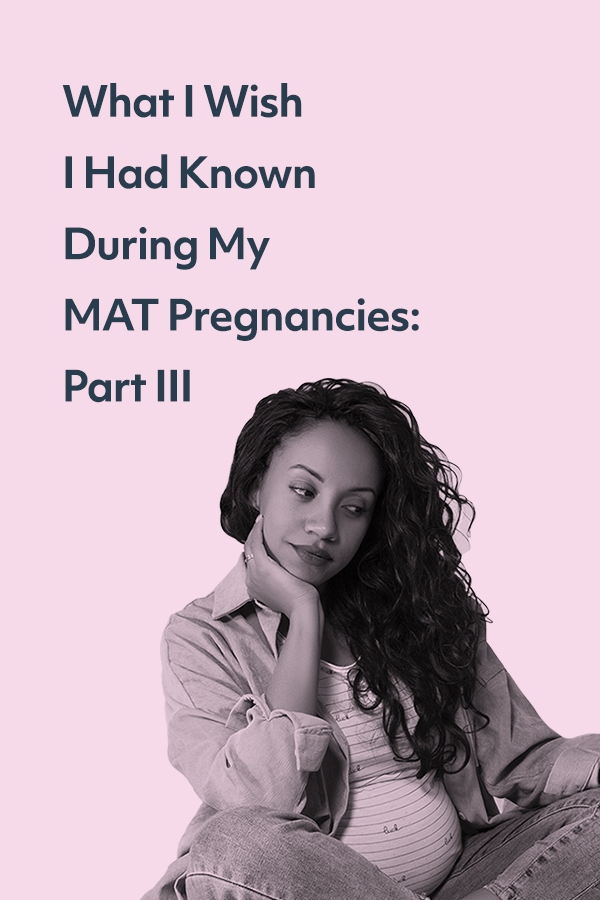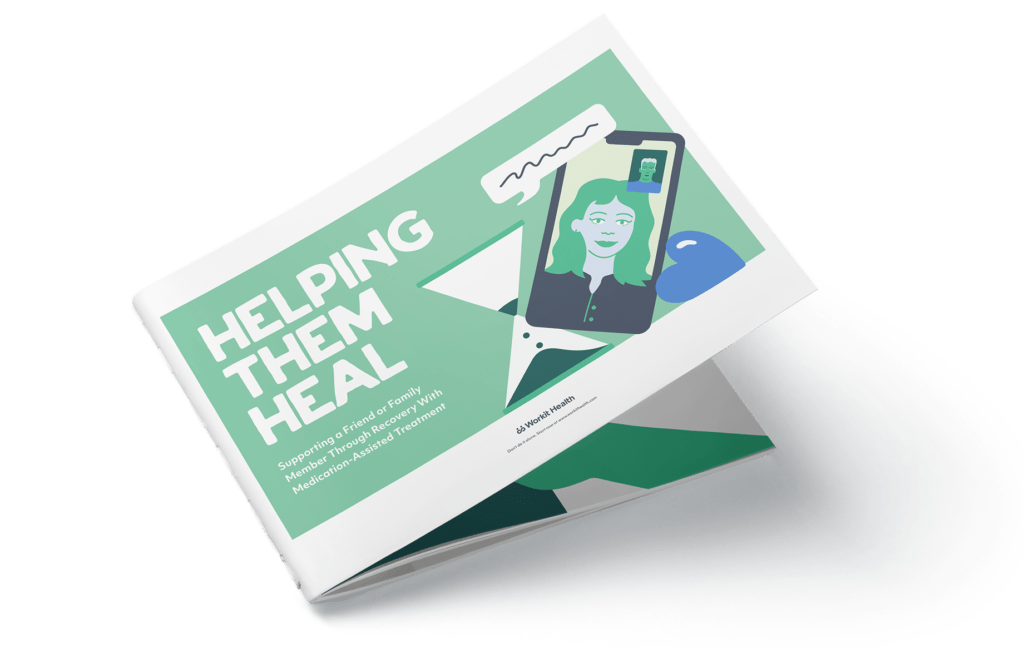In Part III of this series on recovery meds like methadone and buprenorphine during pregnancy, Elizabeth Brico explores emotional and legal issues pregnant women on MAT face.
Welcome to the final installation of my three-part series on WorkIt Health about issues surrounding medication-assisted treatment during pregnancy. If you’re reading this, you’re probably pregnant and using methadone or buprenorphine, or thinking about getting on one of these medications to help treat your opioid use disorder. Or maybe you know someone else who is. Either way, I’m glad you’re here, and I hope I help you with some of the questions I had when I was pregnant on MAT. If you haven’t read parts one and two yet, check them out here and here.
Before reading further, you should know that I am not a medical expert. Rather, I am a patient who used methadone and buprenorphine during two separate pregnancies. The information I’m sharing with you is based on my personal experience, and research I’ve conducted on the topic.
In the prior segments, I talked about some of the social and medical issues related to MAT during pregnancy. Topics like stigma, medication side-effects, and neonatal withdrawal. In this final installation, I’ll go over some of the emotional and legal issues you may face.
If you’re addicted to opioids, MAT is the right choice during pregnancy
Through both of my pregnancies, but especially while on methadone, I continuously worried about my child’s potential withdrawal. I worried she would be in pain. I worried she would have problems later in life because of the medication or the trauma of the withdrawal. Even now, when my daughter gets really angry, or doesn’t want to listen, or acts cruelly toward her sister, I sometimes wonder if it’s because of the medication I took while pregnant. I have to remind myself that anger is a natural emotion, kids don’t always listen to their parents, and sibling rivalry is pretty common. But there’s still a part of me that wonders. If you’re feeling worried or guilty, I get it.
You’re doing the right thing. Methadone and buprenorphine are the most effective treatments for opioid use disorder (OUD). Don’t just take my word for it—the World Health Organization considers them “essential medications” for treating addiction to opiates. Detoxification during pregnancy is risky. Although newer studies have shown that it’s possible to have a safe prenatal opioid detox under medical supervision, not all of us have the option of a medically supervised detox. And, abstinence (especially during early recovery) significantly increases the chances of relapse, which poses a big risk to your baby. So, if you’re addicted to opiates and you’re taking your meds as prescribed, methadone or buprenorphine are the best and safest choices for both you and your baby during pregnancy.
I don’t think any amount of reading will ever prepare you for the experience of seeing your child go through opioid withdrawal. Although not all opioid-exposed infants will experience postnatal withdrawal, many will (see part two in this series for ways to reduce your baby’s chances of withdrawal). Especially if you know what withdrawal feels like—and let’s be real, if you need methadone or buprenorphine, you do—it is absolutely heart-wrenching to watch your newborn sweat and squirm in her crib. There’s no way around it: if your baby experiences neonatal abstinence syndrome (NAS), you’re going to hurt.
This is why you need to keep reminding yourself that you did the right thing. Although your baby’s first days of life are not ideal, he is alive because of you. Getting sober from addictive substances and onto prescribed medication made you able to be the mother that your child needs. It gave him life. As much as it hurts, remind yourself that your child’s pain is temporary, and it’s the result of a courageous and medically sound choice.
I also found that it helped me to be as involved as possible in my daughters’ care. I held them as much as possible, breastfed when I could, and roomed-in when possible. These actions also help reduce the severity of NAS. Not only will you be nurturing the essential mother-child bond; you will also be taking action to help soothe your baby’s symptoms.
Dealing with Child Services
Depending on where you live, you might get a call or visit from your local child services department. Federal law states that mandated reporters, like nurses and doctors, must report drug-exposed newborns. This means that if your child experiences NAS, tests positive for opioids, or if you test positive or even just report your medication (which you should for medical purposes), someone from your hospital will probably report you to child services. That sounds really unfair—and in many ways it is—but it’s not necessarily a huge concern.
Depending on the policies where you live, child services might not even contact you. If nobody suspects you of using other substances while in treatment, child services may forgo an investigation. If you do hear from child services, however, it doesn’t mean you’ve done anything wrong. When I had my daughter in King County (Seattle, WA) while I was taking buprenorphine, I never heard from child services. When I had my daughter in Palm Beach County (Lake Worth, FL) while on methadone I did. A social worker came to the hospital. She interviewed me and my husband. She even called my mom, who was all the way in Seattle and had no idea at the time that I was even on methadone. It was extremely intrusive—but that was the worst of it. My urinalysis records all showed that I was compliant with the program, and the case was closed without intervention.
Some people are less fortunate. If your records show you relapsed while pregnant, or if your caseworker is just really ignorant about MAT, you could experience pushback. A lot of people say that if you have to deal with child services, you should just put your head down and do what they say. That works for some people, and it’s totally fine to choose to do that. But fighting for your rights is also an option. If you want to go that route, remember to remain respectful. Anything you say—or the way you say it—can and will be used against you. Remain compliant in treatment. Keep up with you and your baby’s postnatal appointments, and take notes of everything your care workers have you do, and when you do it. That’s my advice as a person who’s been in this situation, not as a legal professional. You definitely want to contact a legal professional.
If your case goes before a judge—which means you’re facing temporary or permanent custody termination—you will be assigned a free lawyer (unless you can afford your own). If you’re not facing termination, but you still feel that you’re being mistreated by child services, you’ll probably have to find legal counsel on your own. There are some organizations around the country that help with these types of matters. The National Alliance for Medication Assisted Recovery (NAMA-R) can’t give you legal counsel, but they may be able to refer you to resources. They have chapters across the country, and a lot of wonderfully caring people who work for them. Legal Action Center specifically deals with issues pertaining to parenting and MAT discrimination. They can only provide legal help in certain parts of the United States, but if they can’t help you, they can also provide referrals. Both organizations are run by people who truly care and understand, many of whom have their own addiction histories. If you think your rights have been violated by child services because of your use of methadone or buprenorphine, reach out to them. You deserve to be treated with respect.
Tapering down
Now that we’ve gotten the emotionally grueling stuff out of the way, let’s talk about a physical issue. Some people decide they only want to be on MAT during the pregnancy but want to come off right after giving birth. I felt this way when I was on methadone. Others want to remain on MAT for a while—that’s what I did with buprenorphine. Whichever category you fall into, you’re probably going to need to taper down. This is because pregnant women typically need higher and sometimes even more frequent doses of methadone or buprenorphine. Once you give birth, your blood volume and weight decrease, plus you no longer have your baby in there taking some of your dose.
When I was on methadone, the difference was immediate and intense. The day after giving birth, I was nodding out and hallucinating from a dose that felt totally normal while I was pregnant. I was even barred from holding my daughter once when the nursing staff thought I was high. Luckily I had my UA records to show I hadn’t relapsed. But I didn’t start to feel normal until I cut my dose in half. Don’t be surprised if your dose is suddenly too strong.
It’s important to listen to your doctor—but also to your body. My clinic wanted me to taper down by 5mg a week. I wanted to taper by 10mg a week because my dose felt so overpowering. In order to do that, however, I would have had to sign a paper stating I was tapering against medical advice. This is a tricky situation, especially when child services is involved. You don’t want to look like you’re doing anything against medical advice, because someone can try to make the argument that you’re misusing your medication. But if you feel your dose is dangerously high, that’s not something you should ignore. My best advice is to insist upon an appointment with the clinic doctor and tell them your exact concerns. Doctors don’t want their patients overdosing, so if you feel you’re at that point, he has to work with you.
If you’re only tapering to a comfortable dose and not to get off altogether, make sure to listen to your body’s signals. Don’t put yourself into a position where you’re in withdrawal, because raising your dose is a process when you’re no longer pregnant.
Good luck
Thanks for reading my series on WorkIt Health about medication-assisted treatment and pregnancy. I had a lot of questions and conflicting emotions during my MAT pregnancies. I hope I was able to answer some of yours. Good luck with your parenting journey—and remember: You are good. You are valuable. You are loved. And you’re doing the right thing.






